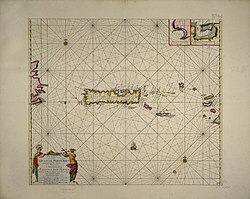Captaincy General of Puerto Rico
| Captaincy General of Puerto Rico | ||||||||||||
| Capitanía General de Puerto Rico | ||||||||||||
| Captaincy General | ||||||||||||
|
||||||||||||
|
||||||||||||
|
Anthem National anthem of Spain |
||||||||||||
|
Map of Puerto Rico (1712)
|
||||||||||||
| Capital | San Juan | |||||||||||
| Languages | Spanish | |||||||||||
| Religion | Roman Catholicism | |||||||||||
| Government | Monarchy | |||||||||||
| King | ||||||||||||
| • | 1580–1598 | Philip II | ||||||||||
| • | 1759–1788 | Charles III | ||||||||||
| • | 1886–1898 |
Alfonso XIII Maria Christina of Austria (Regent) |
||||||||||
| Governor | ||||||||||||
| • | 1580 | Jerónimo de Agüero Campuzano | ||||||||||
| • | 1898 | Ricardo de Ortega y Diez | ||||||||||
| Historical era | Early modern Europe | |||||||||||
| • | Administrative reorganisation | 1580 | ||||||||||
| • | Treaty of Paris | 1898 | ||||||||||
| Currency | Spanish real, peso | |||||||||||
|
||||||||||||
| Today part of |
|
|||||||||||
The Captaincy General of Puerto Rico (Spanish: Capitanía General de Puerto Rico) was an administrative district of the Spanish Empire, created in 1580 to provide better military management of the island of Puerto Rico, previously under the direct rule of a simple governor and the jurisdiction of Audiencia of Santo Domingo. Its creation was part of the, ultimately futile, Habsburg attempt in the late 16th century to prevent incursion into the Caribbean by foreign powers. Spain also established Captaincies General in Cuba, Guatemala and Yucatán.
The Captaincy General played a crucial role in the history of the Spanish Caribbean. The institution lasted until 1898 in Puerto Rico, when an autonomous local government, headed by a governor-general and an insular parliament, was instituted just months before Spain ceded Puerto Rico to the United States in 1898 following defeat in the Spanish–American War.
In 1508 Juan Ponce de León was commissioned by the Crown to carry out the initial colonization of Puerto Rico. After successfully founding the city of Caparra (on the site of today's Guaynabo), he was appointed as its first governor in 1509 by the regent of Castile, Ferdinand V. Since Christopher Columbus's death in 1506, the Spanish Crown had refused to recognize his heirs' right to appoint governors of the West Indies, but in 1511 the Council of Castile ruled in Diego Colón's favor. As a result, Ponce de León lost his position and left the island, not wishing to serve under Colón.
...
Wikipedia



